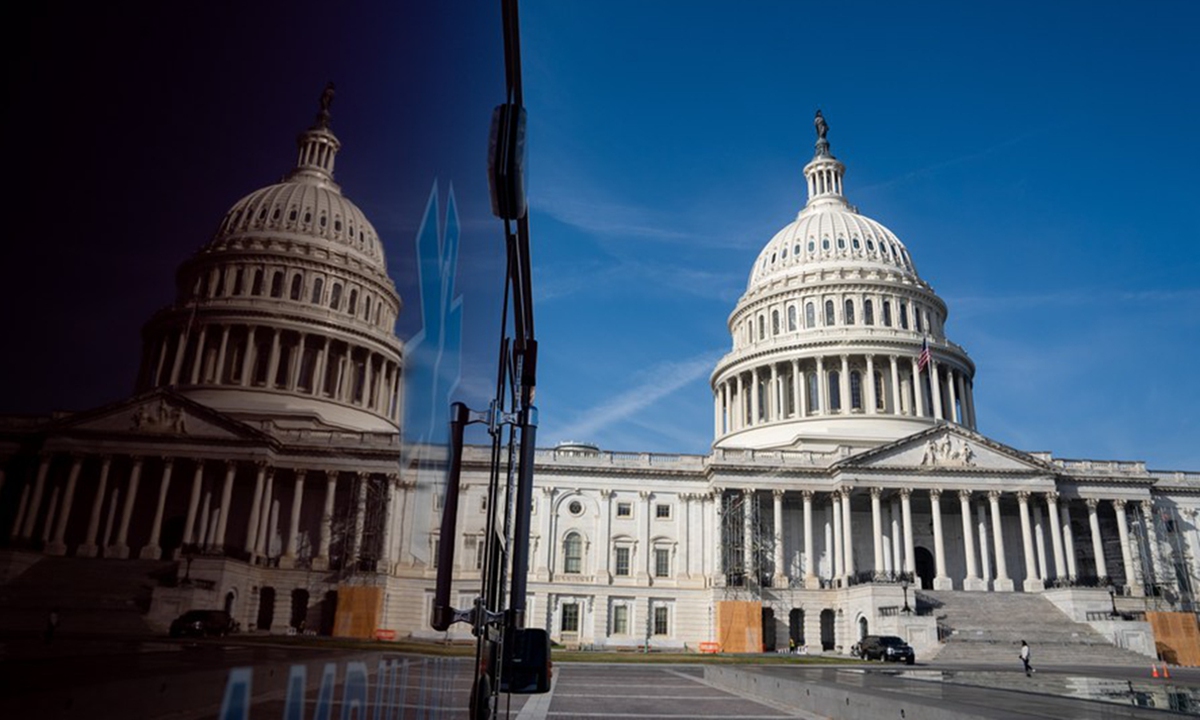
The US Capitol building is seen in Washington, DC., on November 4, 2022. Photo: Xinhua
The election of Mike Johnson as new US House Speaker eventually, if only temporarily, ends the chaos in the House after the removal of Kevin McCarthy and the weeks-long vacancy of this position. As the fourth Republican nominee, Johnson was elected after three candidates fell victim to the vicious political battles in the US, which CNN has aptly likened to the "political lifespan of mayflies."
In fact, the struggle to appoint a Speaker is not a recent development. Former Speaker McCarthy also went through multiple Senate elections and compromises before being selected. However, some of those who had voted in favor of him believed that many of McCarthy's actions betrayed them, leading to his removal from office. This highlights the severe polarization in US politics, with limited room for compromise, whether within the Republican Party or between Republicans and Democrats.
Xu Liang, an associate professor at the School of International Relations of Beijing International Studies University, told the Global Times
that the election of a new House Speaker is just "a matter of expediency." The fact that Johnson won the support of all 220 Republicans who cast a ballot indicates that the Republicans are determined to not let Democrats gain extra advantage. Especially as the US presidential election approaches, it is crucial for the Republican Party to present a more unified image. Therefore, it could be expected that the next round of partisan struggle between the two parties will be fiercer.
Despite the election of the House Speaker, US politics has exhibited signs of division and self-destruction, which will have a negative impact on domestic and foreign affairs in the US. This self-destructive behavior of US politics is a heavy blow to the US' image as a beacon of democracy. It will become even more difficult for Americans to persuade other countries to accept their so-called democratic system. From the 2020 presidential election saga to the House Speaker chaos, farce has become the new normal in US politics. These abnormal farces have exposed the problems in the US separation of powers and the two-party system up to this day, namely, the disconnect between the design of the system and reality.
The flaws we are witnessing in US electoral and party politics have sounded the alarm for many developing countries. US-style politics is not a perfect oasis, let alone a Garden of Eden. For many countries, US-style politics is negative in nature. The US has no special right or authority to criticize the political systems of other countries. If the US system and institutions cannot make appropriate adjustments in the wake of challenges and crises, the US system will continue to crack from within.
On Monday, a group of House Democrats asked top US intelligence officials to arrange a classified briefing for Congress on how China is taking advantage of the dysfunction in Washington, citing an op-ed in the Global Times as evidence. They claimed China is engaging in a global propaganda campaign to sow doubt about the strength of the US and US democratic values. Sun Chenghao, a fellow and head of the US-EU program at the Center for International Security and Strategy in Tsinghua University, told the Global Times that while the Chinese media outlet's opinion piece just commented on the challenges and difficulties faced by the US, American politicians are using this opportunity to slander China, and competing on who is tougher on China.
"The behavior of American politician, who denigrate the normal reports and comments of Chinese media, shows their double standard. The American media also report extensively on the chaos in Congress, why do they feel uncomfortable when the same is reported by Chinese media?" Sun asked.
Since when have US politicians become so unconfident about their political system that they cannot tolerate any comments from Chinese media?
China is not interested in the chaos in the US Congress, but is more concerned about its impact on China-US relations and the potential chain reactions resulting from the abovementioned intelligence briefing. Ultimately, it is the US Congress itself that is experiencing internal chaos, and it wants to divert domestic attention by putting the blame on China. This demonstrates the sensitive mentality of US politicians. While they are aware of their country's systematic problems, they do not allow others, especially China, which is defined as a strategic competitor, to criticize them. Instead of smearing China, they should focus on solving the US' own domestic woes.
The author is a reporter with the Global Times. opinion@globaltimes.com.cn

